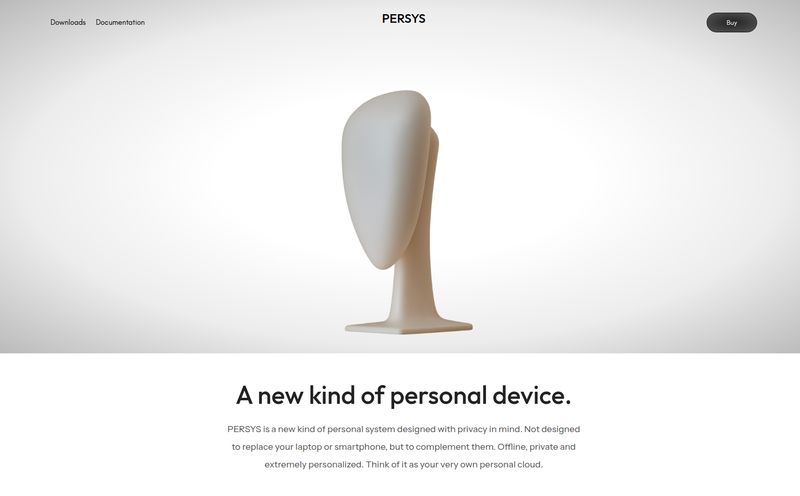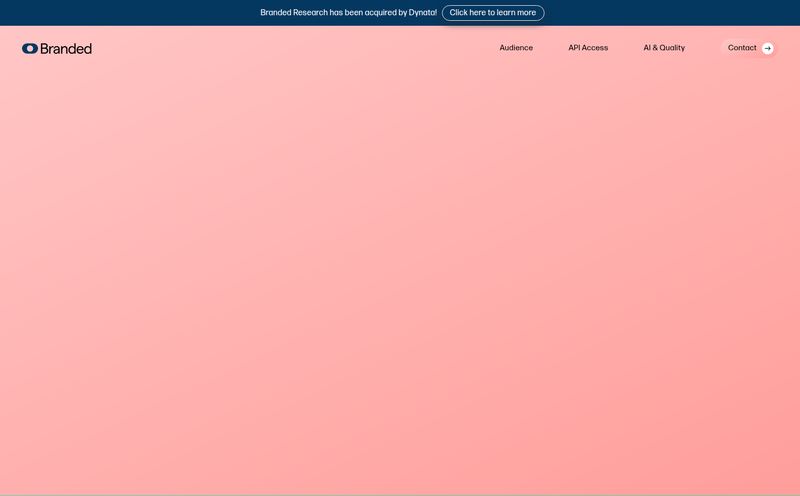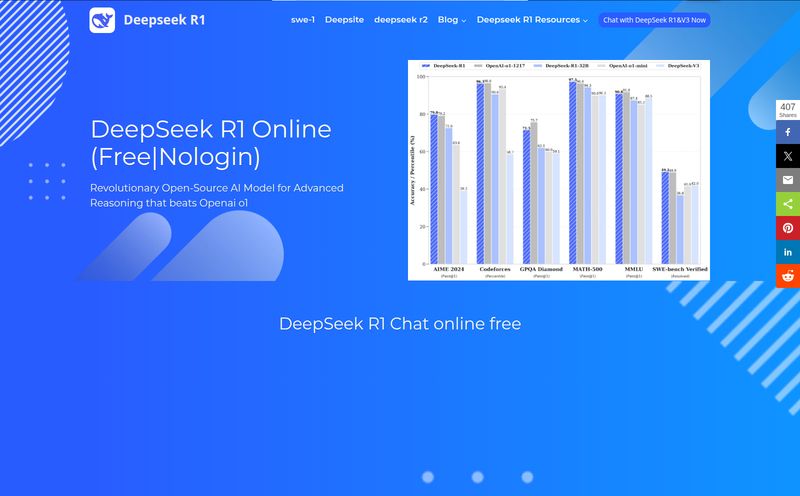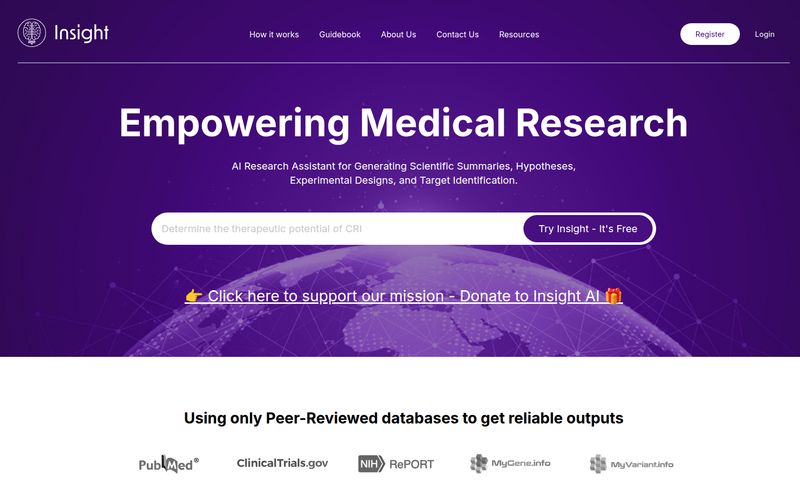Academic research can feel like trying to drink from a firehose. You have a topic, you head over to Google Scholar or PubMed, and you’re immediately buried under a mountain of text links. Page after page of titles that all sound vaguely the same. It's overwhelming, it’s tedious, and if you’re anything like me, you’ve spent more than one late night wondering if you’ve missed the one critical paper that ties everything together.
For years, we've just accepted this as the cost of doing business in the world of research. But what if there was a better way? What if, instead of a list, you got a map? That’s the promise of a fascinating tool I’ve been playing with recently: Open Knowledge Maps.
It’s not just another search engine. It’s a complete rethink of how we discover scientific knowledge, and frankly, it’s about time.
So, What Exactly Is Open Knowledge Maps?
Imagine you’re planning a road trip. You wouldn’t just use a list of every single street in the country, would you? Of course not. You’d use a map to see how cities are connected, where the major highways are, and which areas are clustered together. That, in a nutshell, is what Open Knowledge Maps does for scientific research.
It’s an AI-powered visual search engine that takes your query and transforms the results into a dynamic, interactive knowledge map. The most relevant papers appear as big bubbles, and related papers cluster around them. The map shows you the main areas of a research topic and the papers within each area, all at a glance. It's less like a library index and more like an explorer's chart, showing you the continents of thought and how they relate to one another.
But here’s the part that really got my attention. Open Knowledge Maps is a charitable non-profit organization. Their entire mission is built on the principles of open science. They’re not trying to sell your data or lock features behind an expensive paywall. They’re trying to build a sustainable, equitable, and inclusive infrastructure for discovery that can be used by anyone, anywhere. In an industry that's increasingly commercialized, that is a massive breath of fresh air.
Taking It for a Spin: My First Knowledge Map
Theory is great, but I wanted to see it in action. The homepage is clean, almost deceptively simple. You get a search box and two main databases to choose from: PubMed (for life sciences) and BASE (which covers all disciplines). I decided to try one of their example prompts, "climate change AND impact," using the BASE database.
I hit 'GO' and waited. For about a minute, the AI did its thing—analyzing keywords, text, and metadata from the top 100 results. Then, the map appeared.
And wow. It wasn’t a list. It was a constellation of ideas.
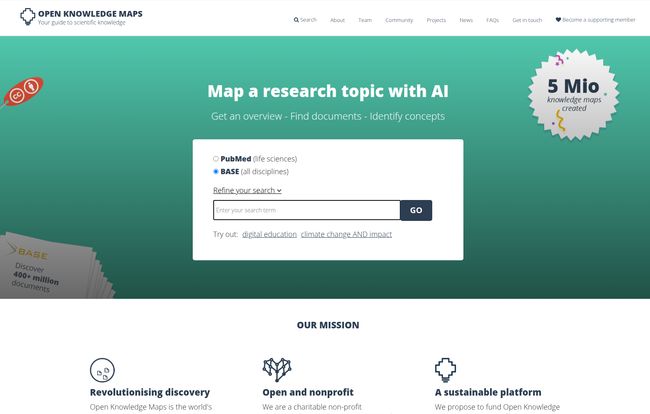
Visit Open Knowledge Maps
There was a large central cluster around 'climate change impacts' itself, but branching off were distinct, color-coded islands of thought. One was clearly about agriculture and food security. Another focused on water resources. A third, smaller cluster dealt with public health implications. I could immediately see the main pillars of the research field without having to read a single abstract.
Clicking on a bubble brought up the paper’s details: authors, abstract, and a link to the full text. The bubbles, the clusters the lines connecting them all tell a story. It gave me an intuitive feel for the landscape of the topic in minutes—a process that would have taken hours of painstaking work the old-fashioned way.
The Good, The Bad, and The Nerdy
No tool is perfect, of course. After spending a good bit of time creating maps on different topics, I’ve got a pretty solid feel for its strengths and weaknesses.
What I Absolutely Love
First off, it's free. Completely and utterly free. As a non-profit supported by academic institutions like ETH Zürich and the Harvard Library (a very good sign), their goal is access, not profit. That alone makes me want to support them.
The visual overview is the star of the show. For students just starting a literature review, or for seasoned researchers dipping their toes into a new discipline, this is invaluable. It’s a way to quickly get your bearings and identify the key sub-topics you need to focus on. It breaks down the 'wall of text' that can be so intimidating.
I also have a huge appreciation for their commitment to open science. Everything is transparent. The software is open source on GitHub, and they operate under a Creative Commons license. This isn't some black-box algorithm; it's a community-driven project dedicated to making knowledge more accessible.
A Few Caveats to Keep in Mind
The biggest limitation, and they're upfront about this, is that the quality of the map is entirely dependent on the quality of the metadata from the source papers. If a paper has a poor abstract or sloppy keywords, the AI might struggle to place it correctly. It's a classic 'garbage in, garbage out' scenario. This isn’t really Open Knowledge Maps’ fault, but a systemic problem in academic publishing. It just means you should treat the map as a guide, not gospel.
The tool also relies on external databases (PubMed and BASE). While these are massive and comprehensive, you're still limited by what they have indexed. Finally, I did get an 'unsupported browser' warning once or twice, which might put off less tech-savvy users, but it's a minor issue.
Who Is This Tool Actually For?
So, who should be rushing to bookmark this site? In my opinion, the sweet spot for Open Knowledge Maps is pretty broad:
- Students and Early-Career Researchers: If you're starting a dissertation or your first major research project, this is your new best friend. It will slash the time it takes to get an overview of the existing literature.
- Interdisciplinary Researchers: Moving into a new field? Use this to quickly understand the dominant theories and key players without getting lost in the weeds.
- Journalists and Science Communicators: Need to get up to speed on a complex scientific topic for an article? This is probably the fastest way to find the foundational research and identify relevant experts.
- The Incredibly Curious: If you're just a lifelong learner who wants to understand a scientific topic without enrolling in a PhD program, this is a wonderfully accessible entry point.
Who isn't it for? Probably the hyper-specialized expert who has already spent 30 years in their niche. They likely already have this map built inside their own head. But for the rest of us, it’s a powerful guide.
The Bigger Picture: A Nod to Open Science
Using a tool like this feels like more than just a productivity hack. It feels like casting a vote for a better, more open scientific ecosystem. The academic world has long been plagued by paywalls and inaccessible information. A tool that is free, open-source, and visually intuitive is a direct challenge to that old model.
When you see their list of supporting members—universities and libraries from all over the world—you realize this is part of a larger movement. A movement to democratize information and make sure that discoveries don't just stay locked away in expensive journals, but are visible to science and society alike.
Frequently Asked Questions
Is Open Knowledge Maps really free to use?
Yes, 100%. It's a non-profit funded by grants and supporting members. There are no hidden fees or premium versions. You can choose to become a supporting member if you want to contribute to their mission.
What topics can I search for?
Pretty much anything. You can search the PubMed database for life sciences and medical topics, or the BASE (Bielefeld Academic Search Engine) database for all scientific disciplines, including humanities and social sciences.
How accurate are the knowledge maps?
The maps are generated by an AI that analyzes the titles, abstracts, and keywords of the top 100 documents for your search. Their accuracy is therefore highly dependent on the quality of that underlying information. Think of them as a highly educated first draft of the research landscape.
Can my organization integrate this technology?
Yes, they offer custom integration services. This could be useful for libraries, universities, or companies that want to embed this visual discovery tool into their own systems.
Does it search the full text of articles?
No, it primarily uses the metadata (title, abstract, keywords, authors) to create the maps. It then provides links to the full articles, which may or may not be behind a paywall depending on the publisher.
Final Thoughts: Is It Worth Your Time?
Absolutely. Open Knowledge Maps isn't a replacement for deep reading and critical thinking. It won’t write your literature review for you. But what it does is utterly brilliant: it provides a starting point. It gives you a framework and a sense of direction in what can often be a chaotic sea of information.
It’s a tool that lowers the barrier to entry for understanding complex topics. And by championing open science, it's contributing to a future where knowledge is more collaborative and accessible for everyone. So go ahead, map a topic you're curious about. You might be surprised at the world you discover.
Reference and Sources
- Open Knowledge Maps Homepage: https://openknowledgemaps.org/
- PubMed Database: https://pubmed.ncbi.nlm.nih.gov/
- BASE (Bielefeld Academic Search Engine): https://www.base-search.net/
- Open Knowledge Maps on GitHub: https://github.com/OpenKnowledgeMaps
